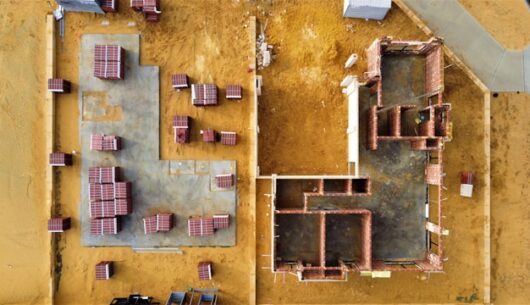Blog
Which foundation for a house with a basement to choose?
Table of contents
- What foundation for a house with a basement will be the best?
- Before you choose a foundation – soil testing
- A house with or without a basement?
- How much do foundations for a house with a basement cost?
There is no house with a basement without proper foundations. These, however, will not be the same as in the case of construction without a basement. In that case, what foundation for a house with a basement will be the best choice? The most commonly used are strip footing and foundation slab. However, the decision between them depends mainly on the bearing capacity of the soil and the water level. Read on for more details!
What foundation for a house with a basement will be the best?
The type of soil, terrain and groundwater level determine not only the profitability of the basement, but also the type of foundation. In the case of houses with a basement, strip foundations or foundation slabs are most often used. Each of these types has its own advantages and is adapted to different ground conditions.
Strip foundations are the traditional and most commonly used solution. It consists of a concrete screed of appropriate thickness, which transfers the weight of the building to the ground. It is a relatively simple structure, but it requires well-drained soil. On the other hand, stepped footings are a modification of this solution, especially recommended for plots with uneven terrain. This type of foundation allows for an even foundation of the basement walls, ensuring the stability of the building even on sloping plots.
The foundation slab , on the other hand, works well in difficult soil conditions, for example on soils with poor load-bearing capacity. The slab distributes the weight of the building evenly over the entire surface, which prevents settling. A foundation slab is more costly, but it gives more certainty for soils with high groundwater levels or wetlands.
Read also: How to choose foundations for a house?
Before you choose a foundation – soil testing
Therefore, in order to answer the question of which foundation for a house with a basement to choose, it is necessary to conduct geotechnical surveys to determine the bearing capacity of the soil and the groundwater level. This is the key information that determines the choice of the right type of foundation and the depth of the building’s foundation.
If the groundwater level is high, it is recommended to use a foundation slab and solid waterproofing. High water levels can cause flooding of the basement and subsidence of foundations, which in turn leads to cracking of the walls.

A house with or without a basement?
However, is it worth deciding to build a house with a basement now? How often it happens during construction works – it depends. The decision to build a house with a basement is associated with various benefits. First of all, the basement can be used as additional usable space, for example as a warehouse, laundry, workshop or pantry. It also plays an important role as a thermal insulator for the entire building. In winter, the basement can reduce heat loss, and in summer protect against excessive heating of living rooms.
However, it is worth remembering that a basement increases construction costs by about 20-30% compared to a house without a basement. And in some, more difficult cases, this amount may increase even more.
How much do foundations for a house with a basement cost?
So, moving smoothly to the price – how much exactly do the foundations for a house with a basement cost? These costs depend on several factors, such as the size of the house, the depth of the foundations, and the building materials chosen. In the case of houses with an area of up to 100 m², you have to take into account the expense of 60,000 to 80,000 PLN for a basement. And in difficult ground conditions, even more.
However, these costs may turn out to be lower if the basement protrudes above the surface and the groundwater is embedded deeply. As you can see – the price varies significantly depending on the specific case.
To sum up, if you are planning to build a house with a basement, the decision on the right foundation requires taking into account the ground conditions and water level. Therefore, it is worth conducting geotechnical surveys to avoid unforeseen problems related to ground subsidence or flooding of the basement.